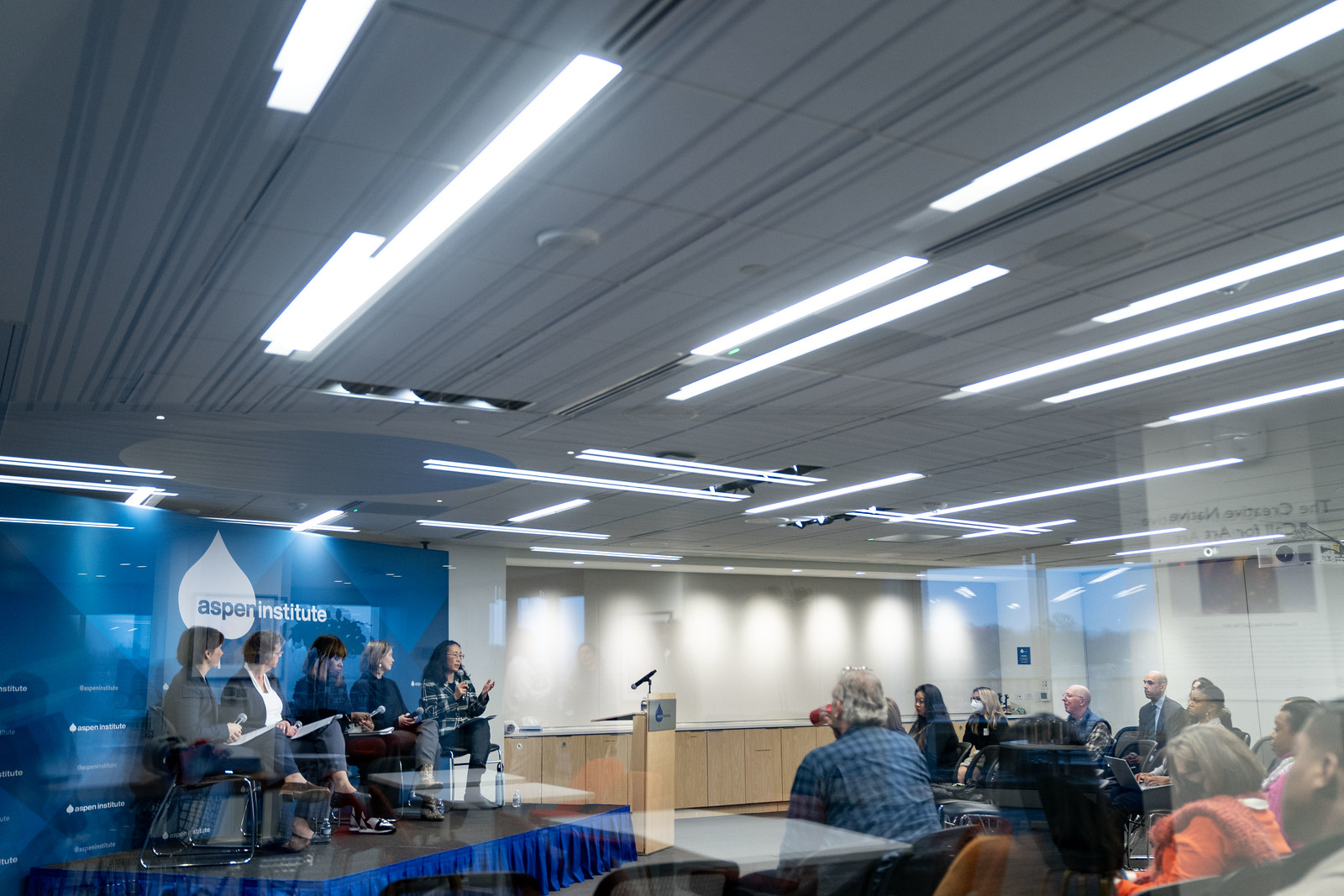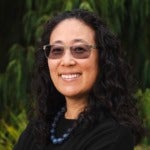How Benefits Make Jobs Better
Description
Workplace benefits can provide workers with economic stability in their lives, opportunities for personal and professional growth, and the chance to build wealth in the long term. Yet the field of benefits offered is incredibly diverse. Deep inequalities in access exist, administration tends to be complex for both employers and workers, and there is little shared knowledge about what benefits are most important for workers’ well-being.
Join the Aspen Institute Economic Opportunities Program to build that shared knowledge through an introduction to the promise and potential of workplace benefits to improve job quality. We will share findings from recent research conducted by the Future of Work Initiative highlighting challenges faced by workers today. We will then hear from an expert panel about the state of benefits today, current innovative approaches to improve access and effectiveness, and ideas about how to build on these in the future.
This event will take place on Tuesday, January 9, from 1:00 to 2:15 p.m. EST, online on Zoom and in person at the Aspen Institute offices in Washington DC.
Photos
Speakers
Betsy Biemann
CEO, Coastal Enterprises Inc. (CEI)
Betsy is the chief executive officer of Coastal Enterprises Inc. (CEI), a community development financial institution working to grow a just, vibrant, and climate-resilient future for people and communities in Maine and rural regions nationally. Growing good jobs is central to CEI’s work. Before joining CEI in 2016, Betsy led Growing Maine’s Food Industry, Growing Maine, a project of the Mossavar-Rahmani Center for Business and Government at Harvard University, and consulted for companies, foundations, and nonprofits.
From 2005-2012 she was president of the Maine Technology Institute, investing in companies and initiatives seeking to grow high-potential sectors of Maine’s economy. Prior to her move to Maine, Betsy was an associate director at The Rockefeller Foundation in New York City, where she managed a national grant and investment portfolio aiming to increase employment in low-income communities. She joined Rockefeller in 1996 after working in international development, principally in sub-Saharan Africa.
Betsy serves on the boards of the Opportunity Finance Network, the New Growth Innovation Network and the Elmina B. Sewall Foundation, and several financing subsidiaries of CEI. She earned her Bachelor of Arts at Harvard University and her Master of Public Affairs at Princeton University’s School of International & Public Affairs and was in the first cohort of the Aspen Institute’s Job Quality Fellows. She lives in Brunswick, Maine with her husband and their two dogs.
Tonya Hallett
In her current role as Amazon Vice President for People, eXperience & Technology (PXT) on the Worldwide Amazon Stores leadership team, Tonya’s focus is to integrate an HR strategic agenda of talent & inclusion, with a clear cost-to-serve, return on investment framework for over 190,000+ corporate employees and another 1.5 million hourly workers globally. Her scope extends to leading the human resources strategy for Amazon’s general & administrative functions: Finance, Legal, Security, M&A, Communications Public Policy and HR, representing another 68,000 employees. She proudly serves as an executive sponsor for both global Women at Amazon and the BEN (Black Employee Network) Women affinity groups for women, non-binary employees and allies.
Tonya began her career with General Motors, progressing through several positions across many geographies and brands making a lasting impact in each role. Her strategic vision, coupled with her exceptional problem-solving skills, has enabled her to navigate complex business landscapes and steer organizations towards success.
Her unique roles include a market-based HR leadership role with Pepsi Bottling Group in the Pacific Northwest, an international assignment in Germany with Adam Opel GmbH, architecting the talent strategy for the reinvention of the iconic Cadillac brand and leading the 2019 restructuring of GM’s Global Manufacturing function, impacting approximately 150,000 employees. Notably, Tonya was the Vice President of Human Resources for Touchtunes Interactive Networks, the largest out-of-home interactive entertainment & music related commerce network in North America.
Tonya’s leadership style is characterized by her commitment to fostering a collaborative and inclusive work environment. She believes in empowering her teams, encouraging creativity, and nurturing talent, resulting in high-performing individuals and cohesive teams.
In addition to her professional accomplishments, Tonya is known for her dedication to community involvement and philanthropy. She actively engages in initiatives that promote social responsibility, making a positive impact on both local and global communities. She serves on the board of the American Association of Cancer Research as a Foundation Trustee and on the Cornell Industrial & Labor Relations (ILR) School Advisory Council. Tonya was recently added as board member to the National Retail Federation (NRF) Foundation in June 2023. She is a member of Alpha Kappa Alpha Sorority, Incorporated, The Links, Incorporated, and Jack & Jill of America, Incorporated. She is passionate about supporting initiatives for enhancing educational opportunities for youth, empowering women, the arts, and cancer research.
She holds a Master of Science in Management from Kettering University, a Bachelor of Science in Industrial & Labor Relations from Cornell University and a certificate in Global Transformational Leadership from Stanford University.
Dr. Angie Kim
President and CEO for the Center for Cultural Innovation (CCI)
Dr. Kim has served as president and CEO for the Center for Cultural Innovation (CCI), a California-based knowledge and financial services incubator for individual artists, arts workers, and creative entrepreneurs, since 2014. She is also the founding director of CCI’s national, pooled fund program, AmbitioUS, which provides grants, loans, and investments in ownership-conferring, alternative economic paradigms of those who are seeking self-determination in order to preserve and support cultural identities on their own terms. She recently launched a new program to research, advocate for, and capitalize alternative safety net solutions for gig workers and their economically threatened communities so as to expand the social safety net to everyone, regardless of source or type of work.
Angie has over 20 years of experience in the arts and in philanthropy, having worked in various roles in grantmaking, public policy, evaluation, and communications at the Getty and Flintridge Foundations, and as director of programs and policy at Southern California Grantmakers. In addition, while successfully pursuing her doctorate on the topic of US private philanthropy, she worked as a consultant helping arts and social justice foundations connect strategic program design with evaluation outcomes. She has been a lecturer on philanthropy at Claremont Graduate University and the University of Southern California, and she has served as an advisor of numerous arts, impact investing, and equity initiatives. She has served on the boards of California Humanities and Leveraging Investments in Creativity, as vice-chair of Grantmakers in the Arts, and as a council member of the American Alliance Association of Museums Center for the Future of Museums.
Kim received her Bachelor of Arts in Art History and English Literature from Linfield College, a Master of Arts in Art History from the University of Southern California, and doctorate in public policy from Walden University.
Emily Martin
Chief Program Officer, NWLC
Emily is chief program officer for the National Women’s Law Center (NWLC), leading the development and execution of an integrated policy and legal strategy across NWLC’s gender justice priorities, with a particular focus on women and girls of color and LGBTQI+ people. She was previously NWLC’s vice president for education and workplace justice, where she oversaw NWLC’s advocacy, policy, and litigation efforts to forward frameworks that allow women and girls to achieve and succeed at work and at school. This included supervising the work of the Time’s Up Legal Defense Fund, which connects those who have experienced workplace sex harassment with attorneys and provides financial support for litigation and storytelling in select workplace sex harassment matters.
She also served for many years as NWLC’s general counsel. Prior to joining NWLC’s senior leadership in 2009, Ms. Martin served as deputy director of the Women’s Rights Project at the American Civil Liberties Union, where she spearheaded litigation, policy, and public education initiatives to advance the rights of women and girls, centering the needs of low-income women and women of color.
She also served as a law clerk for Senior Judge Wilfred Feinberg of the U.S. Court of Appeals for the Second Circuit and Judge T.S. Ellis, III, of the Eastern District of Virginia; served as vice president and president of the board of the Fair Housing Justice Center in New York City; and previously worked for NWLC as a recipient of the Georgetown Women’s Law and Public Policy Fellowship. Ms. Martin is a graduate of the University of Virginia and Yale Law School.
Shelly Steward
Director, Future of Work Initiative, EOP, The Aspen Institute
Shelly Steward serves as director of the Future of Work Initiative, a part of the Economic Opportunities Program. Her team strives to identify challenges faced by workers today and develop policy-based solutions to address those challenges and build a more equitable economy. Shelly is an economic sociologist and applied scholar who has studied the changing nature of work for more than ten years. She is an expert on nonstandard work arrangements and the gig economy and is lead author of the Gig Economy Data Hub in collaboration with Cornell University’s ILR School. She is also a research associate with the Fairwork Project based at the Oxford Internet Institute, which assesses the working conditions of gig economy platforms around the world, and teaches courses on technology and tech policy for the University of California’s Washington Program.
Her academic interests center on how people understand their position in the labor market and how they navigate increasing insecurity. She has studied work in the tech and oil and gas industries in depth, examining how people make sense of and internalize the rising risk and uncertainty of these sectors. She has written for both academic and popular publications, including the Washington Post, the Journal of Contemporary Ethnography, and the Journal of Consumer Culture, and has been quoted in major outlets including the Wall Street Journal, NBC News, and NPR, among others. Shelly received her doctorate in sociology from the University of California, Berkeley, where she was a National Science Foundation Graduate Fellow. She holds a bachelor’s degree with highest honors in sociology from Harvard. Prior to graduate school, she was a middle school science teacher in South Dakota through Teach for America. Outside of work, she volunteers at the National Zoo and enjoys swimming, sewing, and cookies.
Read the Report
Workplace benefits, such as health insurance and retirement plans, are an important component of good jobs. But there is little consistency in what benefits are offered to workers and how those benefits are designed and administered. Our brief, “Benefits Beyond Measure: The Role of Workplace Benefits in Improving Job Quality,” synthesizes existing knowledge on the landscape of benefits available to workers in the United States and the impacts of those benefits. It begins by defining workplace benefits and providing a brief history of their use. It then explores the connection between workplace benefits and job quality, mapping known impacts against key components of job quality. Finally, it reflects on opportunities for improvements in job quality and for future research. Click here to read more.
Opportunity in America
Opportunity in America, an event series hosted by the Economic Opportunities Program, considers the changing landscape of economic opportunity in the US and implications for individuals, families, and communities across the country. The series highlights the ways in which issues of race, gender, and place exacerbate our economic divides, and ideas and innovations with potential to address these challenges and broaden access to quality opportunity.
We are grateful to Prudential Financial, Walmart, the Surdna Foundation, the W. K. Kellogg Foundation, Bloomberg, and the Mastercard Center for Inclusive Growth for their support of this series.
Learn More
The Economic Opportunities Program advances strategies, policies, and ideas to help low- and moderate-income people thrive in a changing economy. Follow us on social media and join our mailing list to stay up-to-date on publications, blog posts, events, and other announcements.





